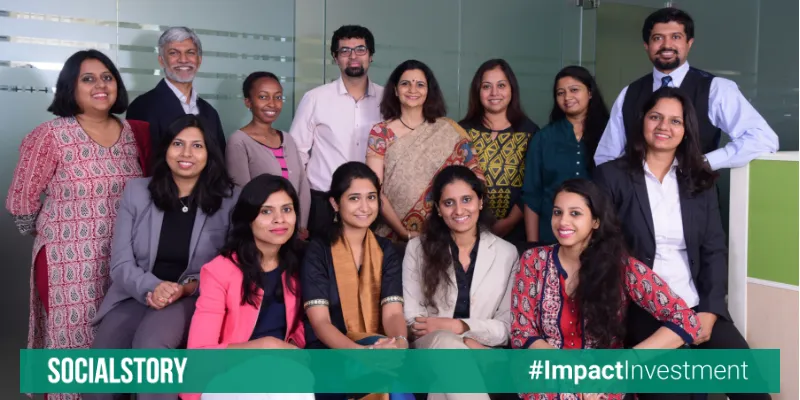From education to gender-focused investments: why Gray Matters Capital is going the impact investment way
Ragini Chaudhary, India Head, Gray Matters Capital, speaks to YourStory on the company’s investment strategy in India, gender lens investing, value beyond the capital, and replicating microfinance models in education.
In 2006, when serial entrepreneur and impact investor Bob Pattillo founded Gray Matters Capital, he brought in the experience of working in the real-estate sector. After a 20-year stint as an investor in the industrial real-estate sector in Atlanta, United States (in the 90s), he began testing the waters in microfinance. This is when the buzz surrounding impact investment was growing. The desire to improve the lives of low-income families while generating strong financial returns brought him to India. The very next year, Gray Matters Capital forayed into education.
With 80 companies under its umbrella since the last 11 years, Gray Matters Capital has navigated the impact investing market by expanding opportunities for both investors and entrepreneurs. In a conversation with YourStory, Ragini Bajaj Chaudhary, CEO India, speaks about the company’s investment strategy in India and why Gray Matters Capital continues to focus on education.

Edited excerpts of the interview:
YS: Gray Matters Capital was one of the largest private investors in microfinance in the 90s. What about affordable education interested Bob Pattillo?
RBC: Bob believes that investment is the best way ahead for demonstration and scale. We had seen success in microfinance, where he had invested $97 million, in 23 funds across India, Latin America, and Africa. By 2007-08, he discovered affordable schooling in the private sector and he created Indian School Finance Company to fund this sector. That is the time they were experimenting within Gray Matters Capital. We started with India. Bob created ratings for schools, much like credit ratings in microfinance. School ratings took into account data on management, governing, and learning outcomes.
YS: As an investor, how do you look at education as a sector for investment?
RBC: The sector requires a lot of work. We know enrolment is high but learning is poor. Companies are offering solutions like e-learning and new modules for experiential learning, but there are no schools to buy them. That's where we come in. As ecosystem investors, we work with education solution providers to make their products more accessible and cost-effective and create market access for them with schools.
YS: In the wake of CSR and many corporates foraying into education, how is your role important?
RBC: We have chosen to focus on private schools because government schools get attention anyway. As much as 54 percent of the CSR budget goes to education. We feel if we bet on entrepreneurs, we bet on the company and spur them to deliver quality.
The problem is at many levels. Private schools don't have any support from government; the RTE has broken their backbone. Second, parents are not discerning. They look at schools in terms of infrastructure, computers and English speaking, not in terms of learning. There seems to be no benefit for a school owner to invest in quality. Who will pay for it?

YS: Why don’t we see many investors in the field of education despite success stories like Byju’s in the Indian startup ecosystem?
RBC: We are trying to spur that. We are working with the National Independent School Alliance (NISA), a platform that brings together budget private schools from across the country and gives them a unified voice to address concerns about legislation and bye-laws. We are strengthening them to eventually work like a Self-Regulating Organisation (SRO). They will commit to working on different aspects of their schools - teacher training, leadership, and learning outcomes so they adhere to critical minimum standards. If they create evidence about really creating value for parents and children, there’s a sector. Everybody is interested in investing in education, but they haven't been able to find disruptive companies to invest in.
YS: As an investor, what’s your take on the future of education?
RBC: Not many companies qualify for investment so we thought we would begin from there. We started with setting up edLABS to seed fund visionary edupreneurs of early-stage for-profit education enterprises as well as to promote business line innovation for established companies. We believe education is about the future. Every child spends so many years at school and returns without learning. But with the job market changing, what you study today may not be relevant tomorrow.
YS: What importance do you place on technology in education?
RBC: For us, technology is not a sector; it’s integral to everything we invest in, be it education or employability. It is the path to scale and efficiency. It is for this reason that we launched the GMC Calibrator – a Mobile EdTech Accelerator Programme with the objective of making the mobile phone the screen of choice for learning and to bridge gender gaps in education and at the workplace.
YS: What do you look for in an organisation or startup in the ed-tech sector when it comes to investment?
RBC: We are looking at improving learning outcomes, focusing on 21st-century skills, and enhancing employability. The solution should have the ability to scale at an affordable price point. It should also be gender inclusive.
YS: How do you quantify the investment process for an early-stage startup?
RBC: There has to be potential. The startup can’t show growth in a day, we know, but we have a target of benefiting 100 million women. We cannot achieve this unless more capital comes in and more people join. We place high importance on demonstration; demonstration without scale is no recognition at all. We want to diversify the base of entrepreneurship and expand innovation.

YS: Social startups usually take longer to grow than regular ones. How do you drive confidence to invest in them during their early days?
RBC: If the product has the potential to scale, we can help them through our networks. I'm here not only to test the product but also guide entrepreneurs and take the product to market. I want them to improve the gender focus and be more customer sensitive.
YS: How do you see subscription-based modules in the field of education?
RBC: The biggest thing is in education that is everything is available to all. As we go further in this journey, we realise that apart from self-learning and reskilling, content has to be personalised. Content delivery is extremely important.
YS: How do you see other impact investors? Are they competition? What kind of collaborations are you entering into?
RBC: I feel the problem is huge. We need a lot of players, of different kinds, to reach different levels of the market. I don't see it as competition but as room for more collaboration. I think that will emerge when more people focused on the sector work together. We haven’t tried working with a government, but we encourage companies to work with the government. We are supporting NISA to become a strong organisation.
YS: Do initiatives like Right to Education (RTE) dilute the purpose of affordable education?
RBC: I feel more efforts needs to be directed towards finding a sustainable partnership between the government and the private sector. The government will stop seeing the private sector as a competitor but see it like a collaborator. They have so much infrastructure, but it’s not the government’s job to run a school. So why not give it to people who can run it well and are accountable? A PPP module is a much better option to fill in a gap like affordable education.

YS: Why does Gray Matters Capital place the kind of importance it does on gender?
RBC: With our experience in microfinance and small loans, we have observed that every time a woman claims a loan, she not only repays and becomes enterprising, but is naturally inclined towards health and education for the future. We have seen that when you empower a woman, you empower others around her.
We want to be able to move the needle in the gender of workforce participation and even the access to education for women and girls. We have to co-exist and empower one another.
YS: What are the future plans of Gray Matters Capital for India?
RBC: India will be the focus for education for Gray Matters Capital India. We have a budget of $40 million for the next three years. We want to grow pan-India and will make special efforts to ensure that companies from Tier II and III cities can be a part of our work.







